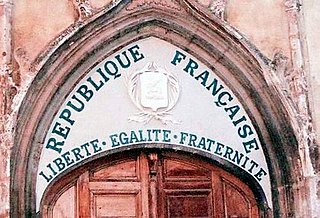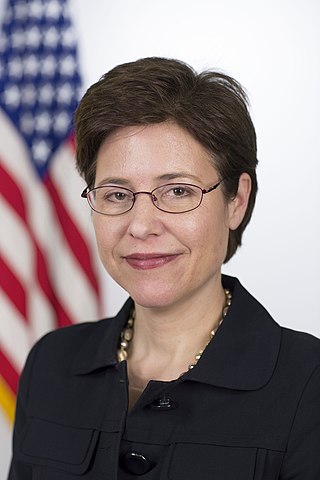Related Research Articles
Secularism is the principle of seeking to conduct human affairs based on naturalistic considerations, uninvolved with religion.

Laïcité is the constitutional principle of secularism in France. Article 1 of the French Constitution is commonly interpreted as the separation of civil society and religious society. It discourages religious involvement in government affairs, especially in the determination of state policies as well as the recognition of a state religion. It also forbids government involvement in religious affairs, and especially prohibits government influence in the determination of religion, such that it includes a right to the free exercise of religion.

The Fraser Institute is a libertarian-conservative Canadian public policy think tank and registered charity. It is headquartered in Vancouver, with additional offices in Calgary, Toronto, and Montreal. It has links to think tanks worldwide through the Economic Freedom Network and is a member of the free-market Atlas Network. Fraser describes itself as independent and non-partisan.

Freedom of religion in Canada is a constitutionally protected right, allowing believers the freedom to assemble and worship without limitation or interference.
A faith school is a school in the United Kingdom that teaches a general curriculum but which has a particular religious character or formal links with a religious or faith-based organisation. The term is most commonly applied to state-funded faith schools, although many independent schools also have religious characteristics.

John Gordon Stackhouse Jr. is a Canadian scholar of religion. His scholarship has been supported by research grants from the Social Sciences and Humanities Research Council of Canada, the Association of Theological Schools, and the Canadian Embassy to the United States.
Theos is a Christian religion and society think tank researching the relationship between religion, politics and society in the contemporary world. Theos aims to impact opinion around issues of faith and belief in society through research, publications, media engagement, podcasts, animated videos, and events such as debates, seminars and lectures. Theos is headquartered in the United Kingdom in Westminster, London.
Ekklesia is a not-for-profit British think tank which examines the role of religion on public life and policy in the UK.

The public image of Mitt Romney refers to how Americans view Mitt Romney. Following his 2008 presidential campaign, Romney's personal and political appearance increased. Romney's values and affiliation with the Church of Jesus Christ of Latter-day Saints are significant factors in his public image and "Faith in America" speech.

Christianity is the largest religion in Uruguay, with Catholics having the most adherents, but around 44.5% of the population is non-religious as of 2021. Church and state are officially separated since 1916.

Marci Ann Hamilton is the chief executive officer and academic director at Child USA, an interdisciplinary think tank to prevent child abuse and neglect. She is also a scholar of constitutional law and Robert A. Fox Leadership Program Distinguished Scholar and Professor of Practice at University of Pennsylvania with dual appointments to Department of Political Science in Penn's College and Graduate School and Penn's Law School. She is an advocate for the enforcement of the Establishment Clause of the United States Constitution. Hamilton also promotes adequate protection for minors, individuals and landowners who suffer as a result of actions which are claimed to be constitutionally protected on religious grounds. Hamilton is critical of provisions within Federal and State Religious Freedom Restoration Acts.

Christianity is the majority religion in Cameroon, with significant minorities of the adherents of Islam and traditional faiths.
The Center for Public Justice is an American Christian think tank which undertakes to bring a Christian worldview to bear on policy issues.

The Cardus Education Survey: A Rising Tide Lifts All Boats is a Canadian report measuring non-government school effects in service of the Canadian public good. The first of its kind to explore the topic in Canada, the study was a survey from a representative sample of graduates of government and non-government schools ages 24–39. The data included graduates from schools in all provinces except for Quebec, which is included separately in the report. The data was collected in March 2012. The report was made available on September 26, 2012, at http://www.cardus.ca/research/education/. A Cardus Education Survey was published in the United States in 2011 called Do the Motivations for Private Religious Catholic and Protestant Schooling in North America Align with Graduate Outcomes?(Cardus I), and it was phase one of the overall project. The Cardus Education Survey: A Rising Tide Lifts All Boats was phase two of the project.
Andrew P. W. Bennett is a Canadian public intellectual. He was the first and only Canadian Ambassador for Religious Freedom, as the head of the Office of Religious Freedom, from the office's formation in 2013 to its closure in 2016.
The Office of Religious Freedom was an agency of Global Affairs Canada that was established by the Government of Canada on 19 February 2013 to monitor religious persecution and protect freedom of religion internationally. It closed on 31 March 2016. In 2021, the Deputy Leader of Conservative Party of Canada Candice Bergen called for the re-establishment of Office of Religious Freedom in Canada to help address issues like the forced conversion of minority girls in Pakistan.

Melissa Rogers is an American church-state lawyer and non-resident senior fellow in Governance Studies at the Brookings Institution. She previously served as special assistant to President Barack Obama and executive director of the White House Office of Faith-Based and Neighborhood Partnerships. On February 14, 2021, President Joe Biden designated Rogers as executive director of the reestablished Office under his administration.
Christian democracy of the type found in Europe never gained a strong presence in Australia. While sectarianism was an important factor in Australian politics in the early 20th century it was only a single element in political divisions at the time, with Roman Catholics along with the Irish tending to be drawn towards the left-wing Australian Labor Party, while Protestants were grouped alongside the British in the various anti-Labor conservative parties of the time.
This is a list of individual liberal and progressive Islamic movements in North America, sorted by country.
The status of religious freedom in Africa varies from country to country. States can differ based on whether or not they guarantee equal treatment under law for followers of different religions, whether they establish a state religion, the extent to which religious organizations operating within the country are policed, and the extent to which religious law is used as a basis for the country's legal code.
References
- ↑ French, Janet (April 19, 2022). "Albertans more likely to believe in a higher power, pray or attend religious services, survey suggests". CBC.
- ↑ Levitz, Stephanie (March 17, 2016). "Religious freedom envoy joins think-tank ahead of Liberals' decision on office". CBC.
- ↑ Craggs, Samantha (February 19, 2020). "City gives faith-based think tank the go-ahead to lease Balfour House". CBC.
- ↑ "Magazine aims to bring religion into public debate". The Globe and Mail. 2011-10-18. Retrieved 2024-05-24.
- ↑ Gyapong, Deborah (January 13, 2017). "Cardus launches Cardus Law to address religious freedom concerns". Catholic Register.